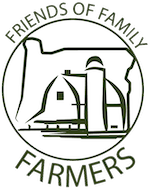We have been hard at work, raising the voices of socially responsible farmers in Oregon. Although we focus primarily on state level policy for solutions for Oregon’s farmers, we have been engaging in some national actions as well to make sure we advocate for all the opportunities producers can tap into to succeed. Here is some info on what we have been working on for the last few months!
National Actions
Friends of Family Farmers recently participated in a “Virtual Fly In” meeting with Sen. Merkley’s D.C. office, organized by the National Sustainable Agriculture Coalition (NSAC), in order to advocate for federal agriculture appropriations for fiscal year 2021. Our new Policy Director Amy Wong was joined by Gwynne Mhuireach of Black Tansy Farm near Springfield, Oregon, and together they advocated for continued and increased Sustainable Agriculture and Research Education (SARE) funding. Gwynne and her husband are currently doing research as part of a $20K SARE grant that is exploring if multi-species rotational grazing will improve soil health. Gwynne said that it seems like the soil is improving, and Black Tansy Farm is also partnering with a microbiologist at the University of Oregon to get conclusive quantitative data to answer this question. Gwynne and her husband are also working with Melissa Ferry of Oregon State University, who leads a Pasture Management course, on a new SARE grant. Logan Hollers, Sen. Merkley’s Policy Advisor, said that Sen. Merkley supports the current SARE funding level ($37 million), and advocated for $2 million more, specifically to support grants for improved soil health, so Gwynne was an ideal advocate!

State Level Actions
Board of Agriculture
FoFF continues to influence state agriculture policy and did considerable outreach to encourage individuals to apply for two of the open seats on the Oregon Board of Agriculture. Ten years ago, FoFF was instrumental in securing a seat for small farmers on the Board, currently held by Shantae Johnson of Mudbone Grown Farm. We were thrilled to see that over 50 people applied, including several that we did outreach to. FoFF will actively advocate for the applicants that we think will best represent the system of agriculture that we believe in. FoFF also attends all Board of Agriculture meetings as a member of the public to listen for new developments and give public comment when needed.
CAFO Advisory Board
FoFF virtually attended the CAFO Advisory Board meeting on July 9. At the CAFO Advisory Board meeting, our Policy Director gave public comment that expressed FoFF’s concerns about the renewal of the MOU (Memorandum of Understanding) between Oregon Department of Environmental Quality (DEQ) and Oregon Department of Agriculture (ODA). The MOU allows DEQ to delegate CAFO oversight and much of the permitting process to ODA. In light of the numerous regulatory failures related to the Lost Valley Farm debacle , which eventually led to the closure of the facility, and ongoing groundwater concerns in the Lower Umatilla Basin, FoFF’s assessment is that DEQ should take the lead role in the regulation and enforcement of federally-defined concentrated animal feeding operations. You can watch the full recording of that meeting here, FoFF’s comment begins at 1:02:25.
Update on Mega Dairies in Oregon

This issue of the MOU between DEQ and ODA is of special concern because on July 1st ODA received a permit application from Easterday Farms, the new owners of the troubled Lost Valley site, for a 28,000-head CAFO operation. The public comment period is tentatively scheduled September 1st through October 5th, however, the Stand Up to Factory Farms Coalition–of which we’re a member–has requested that the period be open for 90 days.
Mega-dairies are a direct threat to small farmers and rural communities as well as our climate, environment, and public health. COVID-19 and the recent outbreaks at Tillamook’s Columbia River Processing Creamery and Threemile Canyon Farm (another mega dairy in Oregon), underscore the vulnerability of our food system caused by these industrial facilities.
Further, rural Oregon populations, including many Latinx and Indigenous communities, who bear the brunt of the harm from mega-dairies are often left out of conversations in Salem. FoFF and Oregon Rural Action have petitions for Southern, Central and Eastern Oregon residents urging Governor Brown to enact a moratorium on mega-dairies. If you are a member of one of these communities, please sign the petition here. We also encourage you to share these with your networks in these parts of the state!
In other Coalition news, see an op-ed in the Bend Bulletin on why Gov. Brown can’t be a climate champion and permit mega-dairies and a recent Letter to the Editor in the East Oregonian on why Threemile Canyon mega-dairy isn’t a sustainable operation. Also, if you missed the virtual discussion on Mega-dairies and Environmental Justice in Oregon and New Mexico hosted by Food & Water Watch you can watch the full talk here.

